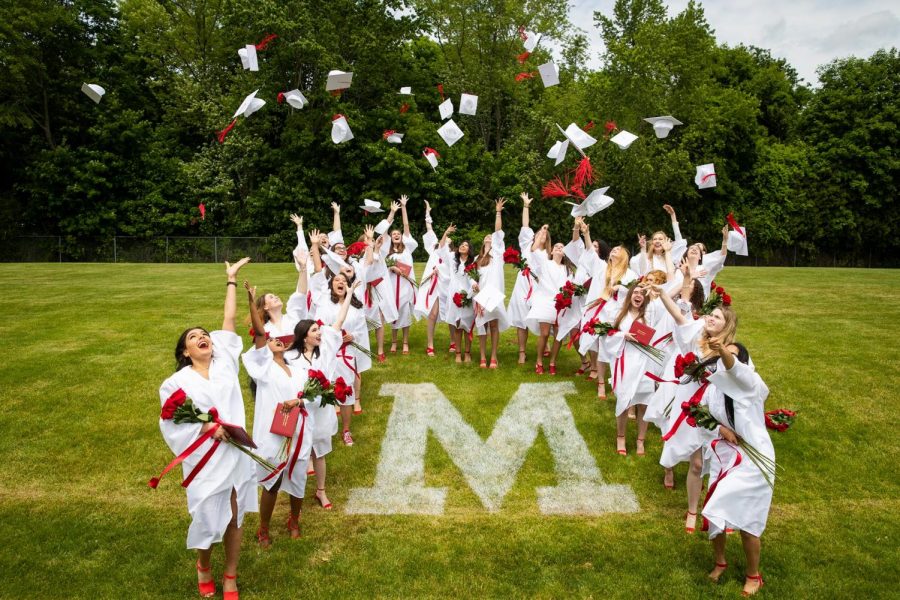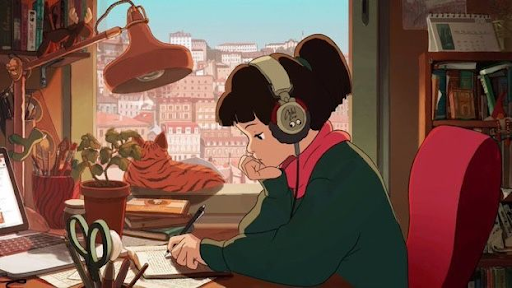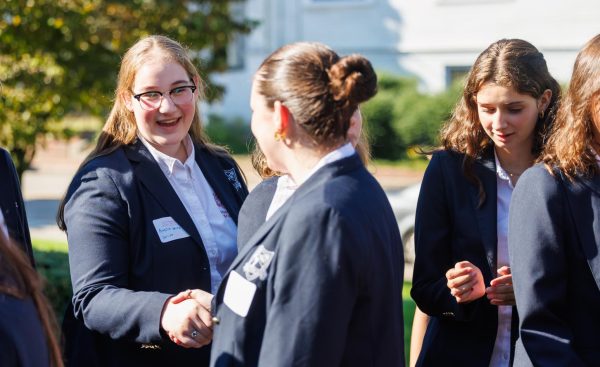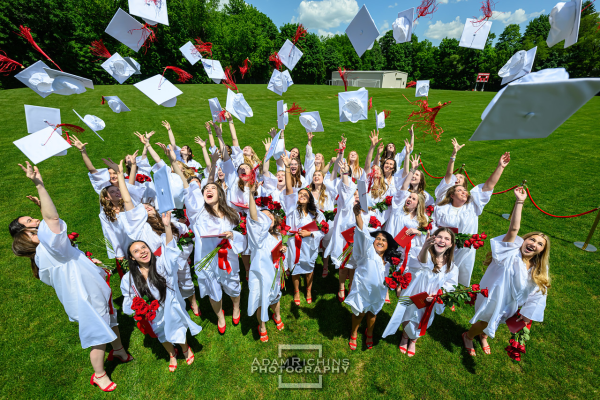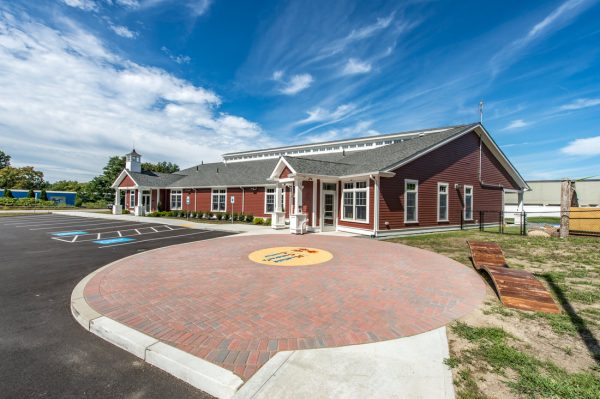Congratulations, Seniors!: Saying Goodbye to the Class of 2021
The Class of 2021 graduated last week on Miracle Field, throwing their caps in celebration.
With my sister as a senior this year, I don’t think a day passed when I didn’t hear someone in my house bring up graduation. Whether it was conversations about all of the Montrose memories she had made, or how “old” she felt, Lucy’s reflections on her Montrose experience and observations about being a senior made me feel more and more attached to this year’s senior class. I had even been to Montrose graduations before, when my older cousins, Molly Cahill ‘16 and Nora Cahill ‘19, graduated not too long ago. The magic of this year’s senior class, along with the eloquent speeches delivered by Dr Bohlin, Mrs. Bachiochi, and the top students made this year’s graduation an unforgettable one. (Mrs. Bachiochi’s speech and the two student addresses are reprinted with permission below.)
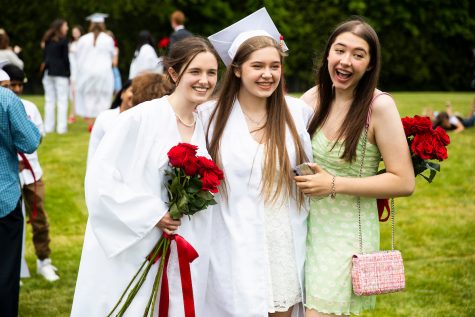
The ceremony began with a prayer from Father John, followed by a welcome from Board of Trustees Chairman Mr. William Noonan. Dr. Bohlin then gave a commencement message where she congratulated the class of 2021 on all of their achievements, especially since their senior year was during such an unpredictable time, coming off of a global pandemic. Because she herself was saying goodbye to Montrose with this year’s graduating class, I think to say that her speech made everyone emotional would be an understatement. Salutatorian Gabriella Bachiochi delivered a wonderful speech about what sisterhood at Montrose means to her, referencing specific memories she had with the class and referencing specific Montrose events such as the Freshman Experience. Mrs. Bachiochi (parent of Anna ‘20, Gabriella ‘21, Lucy ‘23) then delivered an inspiring message to the graduates about “following your questions,” along with advice about finding your place in the world and discovering who you’re meant to be.
When Dr. Bohlin presented personalized comments and a diploma to each student, it became clear why our parents chose to send us to such a small school. She knew each graduate so personally and had well thought out messages for each of them. Lastly, to end the ceremony, Valedictorian Neha Sunkara gave a lovely address to the class. She spoke about her Montrose experience and related it to the two hills in her backyard, one big and one small, saying that her class’s Montrose experience is represented by the small hill; it’s short and easier to climb. But they still have the larger hill ahead of them, which represents the rest of their lives.
With every Montrose graduation I have attended, I have been reminded about where I’m headed on my journey as a Montrosian, and why I’m here. This graduation also taking place mask free represents hope for a new beginning as these graduates, and our beloved Dr Bohlin, begin a new chapter. Congratulations to the graduating class of 2021!
By Chloe Stefani ‘24, News & Fashion Editor
24cstefani@montroseschool.org
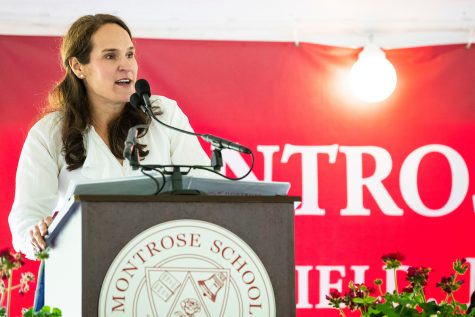
Graduation Speaker tells 2021 Grads: Pursue your Questions and Be the Answers the World Needs
By Mrs. Erika Bachiochi (parent of Anna ‘20, Gabriella ‘21, Lucy ‘23) Scroll to the end of this article to glimpse Mrs. Bachiochi’s biography, with links to her upcoming book and scholarly affiliations.*
It is so wonderful to come together this day to celebrate all you’ve accomplished over the last several years at Montrose… but more than that, to celebrate the confident and radiant women you’ve become.
Today is of course your graduation, an august ceremony in which you will soon be awarded your high school diploma. You have worked hard and learned much under particularly difficult circumstances this year, and so we justly memorialize all of your labors today.
But this day is also a commencement – a beginning – a bringing into existence that next stage of your life, one which all of us here are eager to watch you embark upon.
And so it is a deep honor and special privilege for me, as one who has had an intimate vantage point on this class, to be among those who are sending you off today, onto… the rest of your life.
While we, your parents, grandparents and teachers, your siblings and friends, want you to be successful in whatever you pursue, I think even more than that, we want you to be happy and to be wise. So today, I want to offer you one piece of advice as you begin life’s quest for happiness and wisdom: follow your questions. Yes, follow your questions.
Wisdom, the ancients (like Plato and Aristotle) teach us, begins with wonder. And why shouldn’t this be so? Think of young children, untarnished by the sorted ways of the world, who know neither history nor ideology. Why is the sky blue? They ask. What causes it to rain? Who made the trees? Who made me? Children learn by following their questions.
Yes, we can sometimes lose this orientation by the time we get to school; the questions tend to recede when we’re asked to produce so many answers. But that need not be so. Though your teachers at Montrose have surely expected countless answers, they also have taught you how to ask the right questions, how to follow those questions wherever they may lead, and then how to ask and answer new and more sophisticated questions as they emerge. And so, it seems to me, as a Montrosian, you have a leg up on the noble quest for wisdom, and so for happiness too.
When I was sitting in your shoes – well, not exactly your shoes, mine were black, not red – the tragedies of life had already begun to intensify life’s questions.
I’d spent my early teen years consumed almost entirely by what others thought of me, still admittedly a temptation today. But when a close friend took his own life when I was 16, only to be followed by another who did the same nearly two years later, that doggedly outward focus turned sharply inward.
Why had my friends given up? And why should I press on? More poignant still: What was the purpose of all of this anyway? And thus began a life of following my questions, of seeking to understand others but myself too, of trying to uncover the nature of things and all that life had in store for me.
Following our questions, I’ve found, tends to open us up, to ideas we hadn’t thought to entertain, to people we’re not naturally drawn to, to horizons well beyond our imaginings. Life becomes bigger, grander, more wonder-full than one limited by our own dreams and plans.
By the time I got to college, in small town Vermont, I was intent to “live deep and suck out all the marrow of life,” as Henry David Thoreau explained his journey into the woods. Little did I know how much this deliberate orientation would upend my views about nearly everything. During those years, I often asked God, or “the Universe” as I then referred to him: “how can I help?” And, given the need the world has for much helping, it was a good question to follow indeed.
One summer that question led me to volunteer for my Congressman Bernie Sanders; the next summer, that same question, which had evolved and grown more complex in those intervening months, led me to our nation’s capital to work on welfare reform. There, I discovered people on the other side of the political aisle were asking, in earnest, “how can I help” too.
Then onto graduate school to ask: How am I to live? And to law school: How are we to live?
And as I trained in the law and began to be shaped by it, I started to see that the legal arguments I wanted to make were only as good as the time I’d given to understanding my interlocutors. Really understanding them, not as opponents, but as they understood themselves. And this means following my questions… about what animates their views, what questions might be motivating them, and importantly, where they may be right and I may be wrong.
But this orientation doesn’t only work professionally. I’ve found it’s a recipe for wisdom in our relationships too. St. Josemaria, the founder of Opus Dei whose vision inspired the Montrose founders, said many wise things, but this is among my favorite: “Accuse yourself” he said, “and excuse the other.”
Now of course, he didn’t mean we should excuse maltreatment. Not at all. But he did notice that when we’re quick to point out the faults of others, we’ve got three fingers pointing back in our direction. And so, to be of help, we must first seek to understand. But understanding others doesn’t come about in one conversation or even a dozen.
After all, you and I are not the same people we were just yesterday — each choice we make shapes and reshapes our character. For me to understand you and you to understand me, we’re going to have to ask each other lots of questions, so let’s let one be our guide: “what can I learn from you today?”
But perhaps the single most important question we human beings tend to ask, and my guess is that as Montrosians, you’ve already begun to ask it, is this one: what is my mission in life? What is the unique task that is mine alone? As John Henry Newman, the great theologian and recently canonized saint, put it: “God has created me to do Him some definite service. He has committed some work to me which He has not committed to another. I have my mission…He has not created me for naught.”
Newman’s is noble sentiment, to be sure, but how might we go about discovering that mission?
I would submit to you that it’s by following our questions. It’s been said, and this seems to me just right, that God calls you “where your deep gladness and the world’s deep hunger meet.” And the world is deeply hungry right now, hungry for women of depth, insight, virtue, and faith to bring their deep gladness to bear on the world’s restlessness, divisiveness, and enmity.
But let’s not think that the world’s deep hunger is somewhere out there, or only out there. In my experience, we come upon our unique task – that gladness that is uniquely ours to share – not just by “following our dreams,” but rather by faithfully responding to the small tasks, the small and humble questions of each day. This doesn’t mean we ought not dream, no no, it just means that our dreams take on a new dynamism and meaning when they’ve been sifted through and grow organically out of the soil of living life well… today.
What are the small and humble questions that should animate all human lives, that work to reveal to us little by little our unique mission? Questions like these: Who or what am I responsible for today? How can I use my time well? What ought I do in this situation? How do I treat this person with the love and dignity she deserves?
I think we find our life’s mission not by seeking after some “castle in the air,” but by fulfilling the very concrete duty of each moment, one moment at a time. And as the moments are woven together, and the questions are asked and answered, and the duties are fulfilled, and the love is given, we thereby become the persons prepared for our unique mission; indeed, by being responsible for others in the here and now, we have begun to live out that mission already.
I think I can say with a good measure of confidence that helping you each find your unique mission, your deep gladness, helping you ask and answer life’s questions has been the mission of each of us here today, your parents, your teachers, your family and your friends, and those watching online as well.
It’s a mission that Dr. Bohlin has dedicated the last eighteen years of her life to, and that she now, like you, will go on to share with the wider world. How very blessed Montrose has been to have this wise and happy woman to lead this extraordinary school all of these years!
Class of 2021, you have been given much, and we expect great things from you. You are well poised to go into a world that needs your strength and your talents, that needs your dynamism and your heart… that needs your questions. Go forth and be the answers the world so desperately needs!
Time to Tackle the Big Mountains
By Neha Sunkara ‘21, Valedictorian
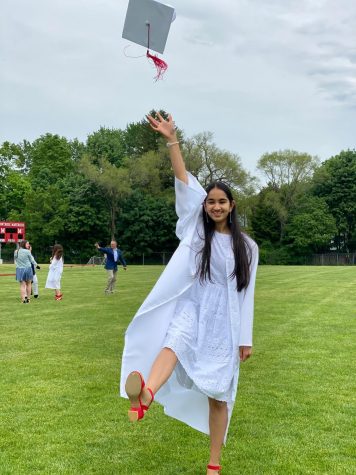
Good morning family, faculty, special guests, our virtual audience, and my sisters, the Class of 2021. Taking a page from Sarah Ling from the class of 2020, I know, as a Latin scholar, that valedictorian comes from the two Latin words: valeo and dico. While valeo means “I bid farewell,” it also means “I strengthen.” So my purpose here isn’t just to end the ceremony or our Montrose journey, but also to give you strength and confidence for your next journey in life.
We all know that life is full of hills and valleys. In fact, when I think about where we are on this journey of life, I am reminded of the two hills in my backyard. The first hill is small, beautifully mowed, and easy to climb one, while the second hill is much larger, full of weeds and rocks, and is daunting. On my birthday this year, while my friends and I were standing on top of the small hill, Anna Sheehan ‘21 said something that struck me: “We are on this small hill looking down but then we look up. Shoot.” The smaller hill represents our journey in life so far while the bigger, more daunting hill represents what we have left. But do not fear the big hill, weeds, rocks and all. We have gained the strengths we need to scale and conquer our fears and uncertainties.
We have learned many things at Montrose while climbing the small hill. At Montrose, we have developed the skills, habits, and relationships that we need to climb the big hill. At Montrose, we have learned that the big hill is something we are capable of climbing, and that the journey up the big hill is something to look forward to. We have developed growth mindsets which allow us to overcome any obstacles on the hill, turning mistakes into lessons to remember. We have learned the power of kindness, joy, and love to inspire everyone around us. We have approached the summit of our Montrose education through our Capstone project. We have gained deep knowledge and have grown in fair-mindedness. But most importantly, we have learned that we all have a telos or a purpose.
This year we studied Aristotle in Capstone, and he believed that everything in nature has a telos or a purpose. He says that our telos is the most important thing that will help us live a conscientious, intentional life. At the beginning of this senior year, I was really struggling with burnout and finding my purpose. I felt like I was just working and working, but I didn’t understand why. When we discussed Aristotle in Capstone class, I realized that, though I possessed all the skills to climb the small hill, I was lacking clarity on my telos or my reason for climbing. This shows, no – no – no, demonstrates just how important telos is: even if you have all the other skills, you won’t be able to climb the hill without your telos. Which is why my most cherished takeaway from Montrose is a question: “What am I aiming at?” By answering this question, I discovered that my telos comes from the deep relationships I have with my family, friends, and teachers. By answering this question, I was able to overcome my burnout by spending time developing my relationships and was able to continue climbing the hill.
Girls, after graduation, we will face difficulties more challenging than bad test grades, procrastinating on Capstone, and lights timing out when we are in the bathroom. Throughout this year, we have each found our telos in our relationships with each other. When we started school during COVID, we bonded with each other. When we were admitted into college, we celebrated with one another. When we began to present our Capstones, we cheered each other on. Girls, let us keep this telos of love and support with us everywhere we go. If we made it through this year, we can definitely make it through anything else.
Together, we have made it to the top of the small hill of high school, the college process, and school during a global pandemic. We have grown so much from our first days at Montrose. No matter where you are on your journey up the big hill, remember to ask yourselves: “What am I aiming at?” This question will help you discover your telos and will give you the ability to tackle new heights and uncertain terrain. And remember that you have developed all the strengths, talents, and support in order to scale not only the big hill but also future mountains. Congratulations to the Montrose Class of 2021!
The True Meaning of Sisterhood
By Gabriella Bachiochi ‘21, Salutatorian
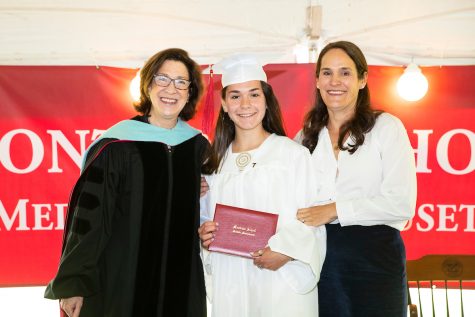
Good morning Montrose faculty, staff, and students, families, relatives, and my sisters in the class of 2021. We have made it to our Montrose graduation! And as we receive our diplomas today, we know how much each of us has grown here. I think we can all agree that we are not who we were the day we entered Montrose’s doors.
And I think I can speak on behalf of the class that we are beyond thankful for our teachers, mentors, teammates, and fellow casts and club members. You have all made Montrose unique and transformative for each of us. Yes, by graduating today, we are recognizing that we have all succeeded at a place with rigorous academics and high expectations. But today, I want to speak more specifically about the sisterhood that stood by us and allowed us to succeed.
The Montrose sisterhood these past three or four or maybe even seven years has also helped each of us become more fully ourselves. We have gone through all the ups and downs, all the successes and failures, all the hard times and good times, together — as sisters.
But, what does it mean to be a sister?
Maybe being a sister means getting creative when solving the Freshman Experience spider web and having the strongest team member throw their smallest classmate through one of the holes in the web to another strong team member on the other side (who by the way ended up with a sprained wrist.)
Or maybe it’s laughing and cheering as we hear each other receive awards about marrying cats or singing show tunes while doing the dishes.
Or planning our senior skip day and forgetting to tell our kidnapper that she was kidnapping us (sorry, Ms Rice.)
It might be breaking a classmate’s ruler while acting out Amy March’s limes scene from Little Women.
Or maybe it’s seeing a mouse, texting the group chat, and getting everyone in trouble the next morning.
Or swimming in 49 degree ocean water — just for the memories.
Maybe it’s running through Medfield center and taking pictures with disposable cameras to complete a scavenger hunt our English teacher had spoiled for us.
Or making a video for a classmate in China updating her about all that was happening and how we missed her. Hi Charlotte, we miss you.
It might be playing manhunt in pitch black in Vermont with Ms Chiodini and Ms Joyce.
Or maybe performing a skit containing terrible dad jokes about Christmas and thinking it was hilarious.
Or maybe setting a 5 AM alarm and sacrificing sleep to watch the sunrise and eat breakfast together on Miracle Field.
I don’t know, but these things sound awfully like sisterhood to me. When thinking about my three blood sisters, I would probably sum sisterhood up with two words: unconditional and shenanigans.
Sisters are there to offer encouragement and listen everyday. And so, sisterhood is about the daily moments. Sisters see each other’s gifts and shortcomings on a daily basis, so they truly know each other. And because your sister understands you so well, you begin to understand yourself too. Sisterhood naturally demands vulnerability because of all the time spent together and all of the challenges in daily life.
Coming to Montrose means joining a sisterhood. That sisterhood began when we first entered the doors, but it does not end today. Just the other day at Mass, I ran into a few alumnae who hadn’t gone to school together in five years but were obviously still committed to a sisterhood that extended beyond this very stage.
So, today is bittersweet. With hope, we move toward the next step on our path in life. We will no longer be together for the small, daily moments next year. But that doesn’t matter, for sisters are sisters for a lifetime.
Mrs. Bachiochi is a legal scholar, a Fellow at the Ethics and Public Policy Center and a Senior Fellow at the Abigail Adams Institute in Cambridge, MA. She founded and directs AAI’s Wollstonecraft Project, which provides university students at Harvard and other colleges in the Greater Boston area with intellectual formation and professional support and mentorship. She has also served as a visiting scholar at Harvard Law School.
Erika is editor of two books and her newest book, The Rights of Women: Reclaiming a Lost Vision, is forthcoming from Notre Dame University Press in 2021. She is also author of several law review articles principally focused on equal protection jurisprudence in U.S. constitutional law. Her writings generally treat jurisprudence, equality and feminism and have appeared in The Atlantic, The Claremont Review of Books and First Things among many other publications.
Erika is an occasional contributor to Mirror of Justice and serves on the Advisory Boards of the Common Good Project, the Catholic Women’s Forum, and the Susan B. Anthony Birthplace Museum. She is a co-founder of St. Benedict Classical Academy in Natick, Massachusetts where she served as President of the Board from 2013-2015. She received a BA from Middlebury College, an MA in Theology as a Bradley Fellow at the Institute for the Study of Politics and Religion at Boston College, and a JD from Boston University School of Law.


